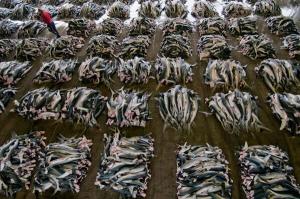The Spanish Minister for Agriculture and Fisheries, Miguel Arias Cañete, has highlighted in a press note the leading role assumed by his government in the application of port and market measures designed to combat illegal, unreported and unregulated (IUU) fishing.
The IUU Regulation, which came into force in 2010, has enabled the European Commission to identify a number of flag States as countries that are failing international commitments to combat IUU fishing. In November 2013 the Commission designated Belize, Cambodia and Guinea (Conakry) as ‘non-cooperating countries’, following earlier warnings. The move, ratified by the European Council and published today, has resulted in a ban on seafood exports from those three countries into the EU.
Spain closed its borders to imports from Belize (mostly tuna, mako, pelagics and swordfish) shortly after the announcement of the Commission’s decision. In 2013 Belize-flagged vessels were responsible for around 8% of the total number of unloading operations in Spanish ports such as Vigo and Marin, though their relative volume was closer to 0.5%. Vigo will be the port most affected by the resulting reduction in unloading activity.
Further, the withdrawal of the Spanish fleet from Guinea’s Exclusive Economic Zone (EEZ) following the country’s designation as a non-cooperating country will be costly for the Spanish sector: Over the past two years, 12 tuna purse seiners, 4 pole and line tuna vessels, 5 shrimping vessels and 4 cephalopod trawlers have operated in the Guinean EEZ, with combined annual captures of around 7,800 tonnes. The loss of the Guinean fishing grounds leaves the cephalopod fleet in particular with few available alternatives.
Despite these immediate losses, Minister Arias has stated his government’s support for catch certificate driven market measures and for the methodical assessment of flag State performance. He described these measures as necessary to ensure sustainability in fisheries and the long-term viability of the industry, with the caveat that flag State assessment must be carried out in a clear and transparent manner. The issue of flag State audit transparency has been the subject on ongoing tension with the Commission, with Spain openly and repeatedly requesting that the key criteria behind third country assessment and rationale for black-list inclusion be open to scrutiny.
The designation of Belize as a non-cooperating third country has been particularly controversial, as echoed in the recent publication of an article in National Geographic highlighting Belize’s conservation efforts in the face of the EU ban (http://newswatch.nationalgeographic.com/2014/03/14/european-union-fisheries-ban-ignores-belize-conservation-success-story/ ).
Mr. Arias challenged the Commission to address States “universally recognised as non-compliant within Regional Fisheries Management Organisations, such as Ghana or Papua New Guinea”. He also expressed concern over third countries “whose compliance with conservation measures is questionable” and that can still export to the EU fish captured in the EEZs of Belize, Guinea and Cambodia.
The Minister also warned against a lack of uniform application of the Regulation leading to the creation of “ports of convenience” within the EU. Trade diversions through such ports could undermine the success of the Regulation and prevent it from achieving its stated objectives.


You must be logged in to post a comment.